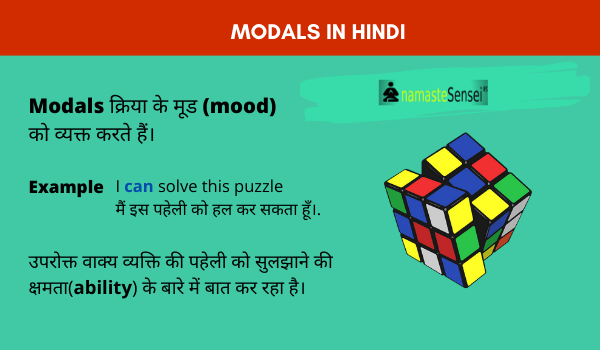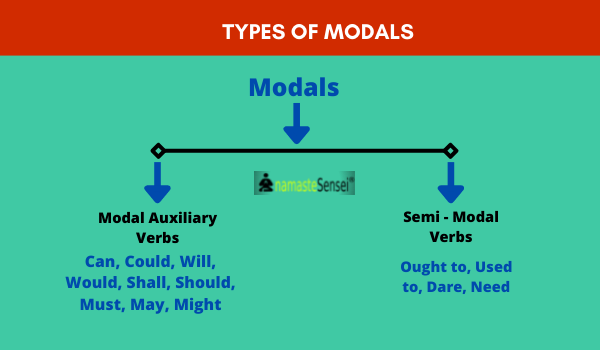Modals Meaning In Hindi | Modals In Hindi

Modals In Hindi And English
- Modals are auxiliary verbs, which express the state of the verb.
मोडल सहायक क्रियाएं हैं, जो क्रिया की mood(अवस्था/ भाव) को व्यक्त करती हैं।
Example of Modals in Hindi – उदाहरण
| I can solve this puzzle. मैं इस पहेली को हल कर सकता हूँ।. उपरोक्त वाक्य व्यक्ति की पहेली को सुलझाने की क्षमता(ability) के बारे में बात कर रहा है। |
| You should solve this puzzle. आपको इस पहेली को सुलझाना चाहिए। उपरोक्त वाक्य में व्यक्ति पहेली को हल करने की सलाह(advice) दे रहा है। |
Features of Modals in Hindi
मोडल की विशेषताएं

- Modals पर कर्ता के Number; singular या plural होने, या कर्ता के person (first, second, third) person का कोई प्रभाव नहीं पड़ता।
Example – उदाहरण
- I can do it.
मैं यह कर सकता हूं। - They can do it.
वे इसे कर सकते हैं। - He can do it.
वह यह कर सकता है। - You can do it.
आप यह कर सकते हैं।
उपरोक्त वाक्य में कर्ता (Subject) चाहे singular है या plural, first person है या second or third person, modal ‘can’ का रूट अपरिवर्तित रहता है जबकि अन्य helping verb (is, are, am, etc.) कर्ता number एवं person के अनुसार अलग-अलग लगती है।
- Always the first form of verb is used along with modals.
हमेशा क्रिया के पहले रूप का प्रयोग क्रिया के साथ किया जाता है।
Example- उदाहरण
| He might win the first prize. वह पहला पुरस्कार जीत सकता है। ‘Win is the first form of the verb. Might is the modal used along with it. ‘Win’ क्रिया का पहला रूप है। Might इसके साथ प्रयोग की जाने वाली मोडल है। |
Types of Modals in Hindi
मोडल के प्रकार

- Can
- Could
- Will
- Would
- Shall
- Should
- Must
- May
- Might
- Ought to
- Used to
- Dare
- Need
- The verbs can, could, will, would, shall, should, must, may, and might are known as modal auxiliary verbs.
Can, could, will, would, shall, should, must, may, and might को मोडल सहायक क्रियाओं के रूप में जाना जाता है। - The remaining verbs—ought to, used to, need, and dare—are known as semi- modal verbs because they can be used as the main verb also.
शेष क्रियाएँ – ought to, used to, need, and dare – अर्ध-मोडल क्रिया के रूप में जानी जाती हैं क्योंकि उनका उपयोग मुख्य क्रिया के रूप में भी किया जा सकता है।
इस लेख में, हमने Semi-Modal verb का उल्लेख नहीं किया है । आप semi-modal verbs के बारे में जानने के लिए नीचे दिए गए हुए लिंक पर क्लिक कर सकते हैं।
जरूर पढ़े – Semi Modal Verbs (विस्तार में)
Use of Modals with rules in Hindi
मॉडल का उपयोग
Use of May/ Might modals in Hindi
Use of May
- To ask for permission and to grant permission.
अनुमति (permission) मांगने एवं अनुमति देने के लिए।
Example- उदाहरण
| Ask Permission Permission – मांगना |
Grant Permission Permission – देना |
| May I go now? क्या मैं अब जा सकता हूँ? |
Yes you may. हाँ आप जा सकते हैं। |
| May I borrow two books from the library? क्या मैं पुस्तकालय से दो पुस्तकें उधार ले सकता हूँ? |
You may borrow one book at a time. आप एक बार में एक किताब उधार ले सकते हैं। |
| May I come in? क्या मैं अंदर आ सकता हूँ? |
Yes you may. हाँ आप अंदर आ सकते हैं। |
- May is also used for making an informal request.
May का प्रयोग informal request के लिए भी किया जाता है।
Example- उदाहरण
| May, I have the salt, please? |
| May I borrow your pen? क्या मै आपकी कलम ले सकता हूँ? |
Use of Might
- Might is used to express remote possibility.
दूरस्थ संभावना को व्यक्त करने के लिए Might का उपयोग किया जाता है।
Example- उदाहरण
| He might win the first prize. वह पहला पुरस्कार जीत सकता है। In the above sentence, Might expresses remote possibility of winning. उपरोक्त वाक्य में Might उसके जीतने की छोटी सी संभावना को व्यक्त करता है। |
Use of Can/ Could
Use of Can
- Can is used to express circumstantial possibility
Can का प्रयोग परिस्थितिजन्य संभावना को व्यक्त करता है।
Example- उदाहरण
| You can go there by road now. अब आप वहां सड़क मार्ग से जा सकते हैं। (As the road is okay now) (जैसा कि अभी सड़क ठीक है) |
- Can is also used to express physical capacity, capability and Mental ability.
Can का उपयोग शारीरिक क्षमता, योग्यता और मानसिक क्षमता को व्यक्त करने के लिए भी किया जाता है।
Example- उदाहरण
| I can solve this puzzle. मैं इस पहेली को हल कर सकता हूँ। In the above sentence, Can is used to express mental ability. उपरोक्त वाक्य में Can का प्रयोग मानसिक क्षमता को व्यक्त करने के लिए किया जाता है। |
| He can read without glasses. वह बिना चश्मे के पढ़ सकता है। In the above sentence, Can is used to express capability. उपरोक्त वाक्य में, योग्यता व्यक्त करने के लिए Can का उपयोग किया जाता है। |
| I can lift this suitcase. मैं यह सूटकेस उठा सकता हूं। In the above sentence, Can is used to express physical capacity. उपरोक्त वाक्य में, शारीरिक क्षमता को व्यक्त करने के लिए Can का उपयोग किया जाता है। |
Use of could
- Could can be used for making a request. Could denote more politeness in a request.
Could का प्रयोग request हेतु किया जा सकता है । Could से more politeness जाहिर होती है।
Example- उदाहरण
| Could you lend me your sofa set? क्या आप मुझे अपना सोफा सेट उधार दे सकते हैं? |
- The use of could expresses the past ability.
Could का उपयोग अतीत की क्षमता को व्यक्त करता है।
Example- उदाहरण
| When I was young, I could climb any tree. जब मैं छोटा था तो किसी भी पेड़ पर चढ़ सकता था। |
| When Ram was young, he could swim across the river. राम जब छोटे थे तो नदी के दूसरे पार तक तैर सकते थे। |
Use of Shall/ will
Use of Shall
- Shall is used with the 1st person to express a general future action.
Shall का प्रयोग 1st person के साथ एक सामान्य future action को व्यक्त करता है।
Example- उदाहरण
| I shall go to market tomorrow. मैं कल बाजार जाऊंगा। Here shall describes future action. |
| We shall play hockey. हम हॉकी खेलेंगे। Here shall describes future action. |
- Use of shall with 2nd and 3rd person expresses promise, determination, threat, warning.
2nd एवं 3rd person के साथ shall का प्रयोग वादा, दृढ़ संकल्प, धमकी, चेतावनी को व्यक्त करता है।
Example- उदाहरण
| Promise – वादा He shall pay you on monday. वह आपको सोमवार को भुगतान करेगा। |
| Determination – दृढ़ संकल्प He shall work hard to achieve success. वह सफलता प्राप्त करने के लिए कड़ी मेहनत करेगा। |
| Warning/ Threat – चेतावनी/ धमकी You shall be transferred if you don’t work properly. ठीक से काम नहीं करने पर आपका तबादला कर दिया जाएगा। |
- The use of ‘shall not’ with the 2nd and 3rd person expresses prohibition.
‘Shall not’ का 2nd एवं 3rd person के साथ प्रयोग prohibition (निषेध) को व्यक्त करता है।
Example- उदाहरण
| You shall not meet him. तुम उससे नहीं मिलोगे। |
| Nobody shall write on the table. मेज पर कोई नहीं लिखेगा। |
| She shall not attend the party. वह पार्टी में शामिल नहीं होंगी। |
Use of Will
- Will is used with the 2nd and 3rd person to express a general future action.
Will का प्रयोग 2nd और 3rd person के साथ एक सामान्य future action को व्यक्त करता है।
Example- उदाहरण
| He will go tomorrow. वह कल जाएगा। Here will describe future action. |
| You will work here. आप यहां काम करेंगे। Here will describe future action. |
- Use of will with first-person expresses promise, determination, threat, and warning.
First person के साथ will का प्रयोग वादा, दृढ़ संकल्प, धमकी, चेतावनी को व्यक्त करता है।
Example- उदाहरण
| Promise – वादा I will pay you on monday. मैं आपको सोमवार को भुगतान करूंगा। |
| Determination – दृढ़ संकल्प I will achieve my goal. मैं अपना लक्ष्य हासिल कर लूंगा। |
| Warning/ Threat – चेतावनी/ धमकी I will see you. मैं तुझे देख लूँगा। |
- The use of will expresses a formal request in the form of a question
Will का प्रयोग प्रश्न के रूप में formal request को व्यक्त करता है।
Example- उदाहरण
| Will you close the door? क्या आप दरवाजा बंद करेंगे? |
| Will you bring me a glass of water? क्या आप मेरे लिए एक गिलास पानी लाएंगे? |
Use of Should/ would
Use of Should
- Should का प्रयोग Duty ( कर्तव्य), Responsibility ( जिम्मेदारी), Advice ( सलाह), probability ( संभावना), Expectation ( आशा), Presumption ( पूर्व अनुमान), Moral obligation ( नैतिक दायित्व), Mild Command ( नम्र आदेश) व्यक्त करता है ।
Example- उदाहरण
| Duty ( कर्तव्य)
One should obey one’s elders. |
| Responsibility ( जिम्मेदारी)
You should take care of your brief case. |
| Advice ( सलाह)
You should take care of your health. |
| Probability ( संभावना)
You should find her in the play-ground. |
| Expectation ( आशा)
The rich should help the poor. |
| Presumption ( पूर्व अनुमान)
He should be worried about me. |
| Moral obligation ( नैतिक दायित्व)
You should obey your parents. |
| Mild Command ( नम्र आदेश)
You should complete your work everyday. |
Use of Would
- The use of would indicate a more polite request than will. Use of would is more valid than will for request.
Would का प्रयोग will की अपेक्षा अधिक polite request को बताता है। Request हेतु will की अपेक्षा would का प्रयोग अधिक मान्य है।
Example- उदाहरण
| Would you accompany me to the railway station? क्या आप मेरे साथ रेलवे स्टेशन जाएंगे? |
| Would you send me an application form? क्या आप मुझे एक आवेदन पत्र भेजेंगे? |
- The use of would also express likelihood, presumption, and probability.
Would का उपयोग संभावना, पूर्व अनुमान और संभाव्यता को भी व्यक्त करेगा।
Example- उदाहरण
| Likelihood – संभावना He would be in the field. वह मैदान में होगा। |
| Presumption – पूर्व अनुमान She would be about 80 now. वह अब लगभग 80 की होगी। |
| Probability – संभाव्यता She would be in the club at this time. वह इस समय क्लब में होगी। |
- The use of would with rather expresses preference.
Rather के साथ would का प्रयोग preference ( प्राथमिकता) को व्यक्त करता है।
Example- उदाहरण
| I would rather rest now. मैं अब आराम करना पसंद करूंगा। |
| I would rather study than see a movie. मैं फिल्म देखने के बजाय अध्ययन करना पसंद करूंगा। |
| I would rather play than rest now. मैं अब आराम करने के बजाय खेलूंगा। |
बधाई हो, आपने Modals in Hindi का पूरा लेख पढ़ा। यदि आपके कोई संदेह या प्रश्न हैं, तो बेझिझक नीचे टिप्पणी करें। हम जितनी जल्दी हो सकेगा संपर्क करेंगे।
अधिक लेख:
Modal Auxiliary Verb |
Adjectives In Hindi (विशेषण) |
| Auxiliary Verb in Hindi | Primary Auxiliary Verb In Hindi |
Any topic you want us to cover. Let us know.
